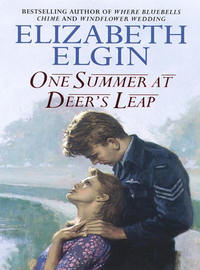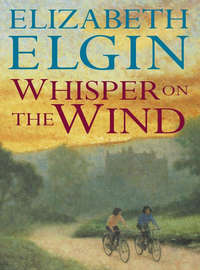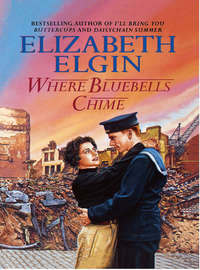
Полная версия
Daisychain Summer
‘Ha! And how’s that little girl of yours, eh?’
‘She’s grand, thank you kindly. Smiled, this morning, for the first time.’
‘I see. And is that usual?’
‘Alice says it is. Next thing, she’ll be chuckling, I’m told,’ Tom grinned, eager to talk about Daisy yet sad his suggestion had fallen on barren ground. ‘I was doing a blackbird for her – you know, that tock-tocking they give out when they’ve been alarmed. It must have tickled her fancy.’
‘A blackbird?’ Tock-tocking, whatever that was? ‘Willow End Cottage, did you say? But it’s in a bad state, or so I’m told.’
‘Don’t you believe it, Mr Hillier. Nothing that a good scrub out and a lick of paint won’t put right – and fires lit, regular, so it won’t go damp.’
‘Hmm.’ Again the gazing into the fire. ‘All right, then. I’ll hold you responsible for his good behaviour since he’ll come without references. He can have Willow End. Ten shillings a week as dog boy, all the fallen wood he can gather, and the usual rabbits. One month’s trial, after which he can send for his family. Is that all right?’
‘I’d say, sir, it’s a fine and kindly gesture and he’ll thank you for it. And Alice’ll be glad, having another woman living within earshot, an’ all – especially when I’m out nights watching the woods.’
‘Right, then. You’d better tell him in the morning. And don’t forget to let them know in the estate office!’ Abruptly, he picked up his newspaper, the interview over. ‘And not a penny more’n half a sovereign, remember!’
‘Right you are, sir. I’ll see myself out – and I reckon Purvis will do all right for Windrush.’
A bit of a come-down, Tom pondered, from keeper to dog boy, but ten shillings a week, a roof over his head and firewood and rabbits was more than a lot of men had, these days. And with luck there’d be a pair of boots thrown in, an’ all!
Not a bad bloke, Mr Hillier – for an employer, that was. A bit abrupt in his speaking, but he’d pulled himself up from nothing, talk had it, and didn’t have the easy way with words that real gentry were born with, Tom allowed.
He wished his father were alive, could tell him what had happened between him and Ralph Hillier. ‘The job of keeper is yours, Dwerryhouse,’ Mr Hillier had said. ‘I owe your father a favour from a long way back, though you might not know it. If your references are all right, you can start at once.’
That had been two years ago, though what the favour, nor when, Tom had never discovered. Sufficient that a deserter should get a job so easily, he’d thought gratefully and left it at that.
He made quickly for home, and wondering what odds to offer that tomorrow didn’t find Mr Hillier gazing into Daisy’s pram, doing his best to make a sound like a blackbird alarmed, he grinned.
A secret man, his employer, and not given to outward emotions, yet a man with a kind heart beneath his waistcoat, and a man who remembered favours owed …
At King’s Cross station, Elliot Sutton wished his aunt and father goodbye, then took a taxi to Cheyne Walk.
‘I hope you’ll find Aunt Sutton much improved.’ He raised his hat, smiling charmingly at his aunt.
‘I’ll keep in touch with your mother,’ Edward said briefly as his son drove away.
‘Perhaps you should have looked in on Clemmy,’ Helen frowned. ‘Put her in the picture …’
‘At seven in the morning?’ Edward demanded. ‘No, I’ll leave it to Elliot to tell her, though he knows no more than I. And what’s going on there and why Clemmy needs Elliot so urgently is beyond me. She has her reasons, I suppose, and I shall be told when the time is right.
‘Now let’s get ourselves onto the Dover train. We should have a smooth crossing. I’ll send a telegram to Monsieur Bossart from Calais – let him know we’re on our way.’
‘You are a good man, Edward. I really shall be glad of your company and the sooner I see for myself that Anne Lavinia is all right, the better.’
‘But you know I’m fond of her – she’s my sister, after all. It’s my duty to go to her, apart from the fact that I want to. So stop fretting, Helen. We should be there by early evening and till then, leave all the worrying to me.’
‘I will indeed.’ He was so like John; so good, so considerate. He didn’t deserve Clemmy nor Elliot; a pity he’d had to follow the only road open to most second sons and marry where money lay. Clementina, the only child of a wealthy ironmaster, had proved to be his salvation, if salvation it could be called, and now Clemmy was richer than ever, her foundries having profited from the war. Sad that Edward could not have been as happy as she and John; a pity his firstborn had been so indulged by his mother.
‘What are you worrying about now?’ Edward cut in to her thoughts. ‘You were frowning.’
‘Oh, just – just hoping Clemmy won’t worry too much,’ she hastened, blushing.
‘Clemmy will not worry at all. My wife is receiving a countess this morning and cannot possibly spare the time to worry about anything else. That Elliot’s presence is needed there makes me think she has started her matchmaking again. She wants him married, you know.’
‘Just like every mother,’ Helen defended loyally. ‘Now things seem to be getting back to normal after the war, I think Clemmy has every right to expect grandchildren.’
‘She has one in America already, don’t forget.’
‘I mean an heir, for Pendenys. We have Drew – it’s only natural Clemmy should want to see things settled, too. Let’s hope Elliot soon finds himself a wife.’
‘You are too charitable, Helen. All I can hope is that the young lady, whoever she might be, comes with plenty of backbone. She’ll need it, married to my son,’ he murmured as a taxi drew up beside them. ‘But let’s see to Anne Lavinia first and leave Elliot’s future in Clemmy’s most capable hands.’
If anyone could get the better of his eldest son, it was his wife. Clemmy had the money; she it was who called the tune. And sooner or later, Elliot would dance to it.
‘So, you’ve got yourself here at last! What kept you?’
‘Mama!’ Elliot bent to kiss his mother but she jerked her head away. ‘I didn’t think to – to –’
‘To find me up so early? I’m up because there’s a lot to do and only three servants to do it! The countess and Lady Anna are calling this morning, so shape yourself! I want you bathed and shaved and your linen changed as soon as maybe! Breakfast is in five minutes; the hairdresser is calling at nine. And a word to the wise, Elliot! The girl next door has taken my fancy, so behave yourself!’
‘Mother, dear – you aren’t playing Cupid again? You know, I really am capable of –’
‘You are capable of nothing, boy! I’ve warned you and warned you. I want you settled down. I want grandchildren!’
‘But you have one already, in Kentucky.’ He shifted uneasily, an eye on the staircase, and escape. His mother was in one of her or-else moods. Do as I say, or else! His allowance, that’s what it would be. She had only stopped it once, but what an uncomfortable month it had been.
‘The one in America doesn’t count. I want a grandson from you, Elliot, and born in wedlock, an’ all. Your Aunt Helen has one. Giles did his duty. Rowangarth has an heir.’
‘Ah, yes – the sewing-maid …’
‘An heir, Elliot, no matter by who! That grandchild of Helen’s kept the title from Pendenys. Your father would have had it, but for him! Helen always lands on her feet!’
‘As did the sewing-maid – or was it on her back?’
‘That will do!’ Clementina’s cheeks blazed bright red. ‘I’m not going to argue the toss with you. You’ve sown your wild oats from Leeds to Paris and back! Now either you find yourself a wife, or else!’
Or else no allowance; bills unpaid and no money for a wager, either! And this morning, he was forced to admit, his mother looked as if she meant it.
‘Mother, dear – can we not go in to breakfast?’ Did they have to talk about it in the hall in full hearing of below stairs, who would be shivering with delight at every syllable of it? ‘Can’t we have our chat over a cup of coffee? I understand perfectly your wish to see me married.’ And I know how damn-awful it is to be without money and that you know that I know it, too.
He opened the dining-room door, jabbing the bell-push as he walked past it, pulling out his mother’s chair.
‘Married? You do? And you are willing to be nice to Lady Anna and the countess – just to please me? It’s all I ask and you know you can charm the birds from the trees when you set your mind to it.’
‘I will be nice to them.’ The worst was over. She had had her say; now she would change to the surely-you-can-do-this-one-little-thing-for-me approach which was better than the dramatic ‘… and-in-my-own-house-too!’ – followed by a fit of sobbing vapours. ‘I promise you I’ll be especially nice to your countess.’
‘And to Lady Anna?’
‘Her too, mother. And now can we eat like civilized people? Breakfast on the sleeper was untouchable. Oh, and father says he’ll keep in touch about Aunt Sutton and that you are not to worry.’
‘Ha! Can’t see why he should go tearing off to France at the drop of a hat! And why does Helen have to be poking her nose in? She’s no more related to your aunt than I am! We are both sisters-in-law, so why was that telegram sent to her in the first place?’
‘Why indeed?’ Elliot comforted, glad they were on a different tack. ‘But you can’t be expected to drop everything, mother. You have a full social calendar …’
‘Yes, I have.’ She held out her coffee cup to be filled. ‘And it’s probably nothing worse than a cut finger! They are soft, those Suttons – not like my side; not like your Grandfather Elliot and the Pendennises …’
She stopped, horrified. This morning, when she was at home to a countess, the last person she must think about was her Cornish ancestress Mary Anne Pendennis!
She gazed across the table at her son; at the only Sutton who was Pendennis dark. All the rest were fair and grey-eyed; all but Elliot whom she loved all the more because of it.
‘You are a great comfort to me,’ she whispered. ‘Only settle down with a respectable girl and you shall have anything you could ever want. That is my promise to you, so think on, Elliot …’
7
The Countess Petrovska arrived punctually, accompanied by her daughter and the servant in black. The servant pressed the bell-push, curtseyed deeply, then returned to the house next door, hands demurely clasped, eyes on her boots.
Clementina Sutton’s door was opened at once by the footman who had waited there for five minutes, flexing his white-gloved hands. Fuss, fuss, fuss. You’d have thought the Queen and Princess Mary were visiting, not some women the Ruskies had flung out!
The footman bowed; Clementina appeared in the sitting-room doorway.
‘My dear countess.’ She offered a hand, fingers limp. ‘And Lady Anna.’
Anna Petrovska smiled prettily, then bobbed the smallest of curtseys in deference to an elder.
‘Countess – may I present Elliot, my son?’
Elliot bowed low over the offered hand, raised it almost to his lips, his eyes all the time on those of the countess. Then he turned his gaze to Anna, nodding, smiling, claiming her attention for a fleeting, intimate second.
He did it so beautifully, Clementina thought with pride. Money, that’s what! Money paid for education and grand tours. It didn’t buy breeding, but most other things came within its giving. So vast a sum spent on Elliot’s upbringing had returned a good dividend. If only he had been born fair like all the other Suttons he would be perfect, she sighed.
‘Please?’ she gestured with a hand. ‘I have rung for tea and coffee. Do sit down.’
Elliot hovered attentively, moving side tables a fraction nearer, offering a footstool, his eyes appraising Anna.
She was tall and slender. Her brown hair was thick and simply dressed. Remove the combs either side of her face and it would cascade almost to her waist.
Elliot Sutton liked long hair; deplored the newest short cuts women were taking to. Tresses and breasts were fast disappearing and both excited him.
Anna Petrovska had high, rounded breasts he could cup in each hand. Her eyes were demurely downcast, her lashes thick and long on her cheek.
She was undoubtedly a virgin. He liked taking virgins but this one he would first have to marry.
Now the servant in black – the one he had watched this morning from his bedroom window – was altogether another thing. Virginal, too, but servants were available. He had observed her closely, pegging sheets to dry; had never before seen so menial a task so gracefully performed. The servant’s breasts were rounded and high, too; her waist was handspan small and her ankles, when glimpsed, had excited him.
He wondered if she spoke any English, but a kiss was a kiss in any language. Mind, he had promised his best behaviour, and there was the rub. If he was to impress the countess as his mother had so firmly demanded, perhaps it were best to place the servant out of bounds for the time being.
‘My mother tells me,’ he smiled at Anna, ‘that you speak the most beautiful English almost all the time.’
‘Except two days ago, when Igor came home,’ she dimpled. ‘Then we forget and we laugh and cry in Russian. Did you know, Mr Sutton, that it is possible even to weep, in Russian?’
‘Your son is home, countess?’ Clementina knew it already, but she wanted the entire story.
‘He is, thanks be. And the boy did well.’ Her eyes misted briefly, then she lifted her chin. ‘Ah, you tell them, Anna. It still pains me to speak of it!’
‘Igor was hurt?’
‘No. All the time he was in Russia he was in danger, but never hurt,’ Anna spoke slowly, softly. ‘My mother is distressed about our houses – our homes. Igor was much put out, you see, to find so many people living in the Petersburg house. Eighteen –’
‘All those people? They just walked in without a by-your-leave; took your house?’ Clementina was genuinely shocked.
‘They did. But not people – families! Mama was desolate when Igor told her. Our rooms shared out, two to a family. Igor had great difficulty getting in there – finding what we had left hidden …’
‘Such a beautiful house.’ The countess had recovered her composure. ‘On the Embankment near the Admiralty – close to St Isaac’s Cathedral, you know,’ she confided as if her new-found acquaintance knew St Petersburg as intimately as she.
‘Near the river?’ Clementina faltered, grasping at the word embankment.
‘Ah, yes. The Neva …’ Briefly Anna’s eyes showed sadness. ‘Such a river. It freezes over in winter, then in the spring the ice begins to break. Such a noise it makes – to let us know winter has gone.’
‘You will return, one day,’ Clementina comforted, ‘to take back what is rightfully yours.’
She made a mental picture of Pendenys Place, that monument to her late father’s riches; saw it packed to overflowing with people from the mean streets of Leeds and her butler, her pompous, plodding butler, pouring her best wines down his greedy throat.
‘Tell me, dear lady, about your country house? Surely not there, too …?’
She handed a cup to Elliot who placed it on the table at the countess’s side.
‘Peasants there, too. Families farming our estate as if it were their own. Igor had to work there, merely to find something we had hidden in a barn …
‘There is much still there – I pray it will never be found – but my son returned with the important things – the title deeds to both properties, and our land. We had taken them from our vaults as a precaution and put them in safer places. One day, perhaps, Igor will be able to go back there and claim what is ours – his.’
‘I would like to meet Igor. He did well. You must be very proud of him.’
‘You shall, and I am, madam. He was also able to find the English sovereigns – gold, you know – and the American silver dollars. They were more than sufficient to buy him out of trouble and pay for his journey back to England. But he had to dress like a peasant and work and act like a peasant to do it.’
‘Oh, dear.’ Genuine dismay showed on Clementina’s face. ‘But so very brave,’ she gushed.
‘So brave. He has proved himself a man, and worthy to inherit his father’s title – such as it is worth, now.’
‘Igor,’ whispered Anna, ‘was also able to obtain the keys to safe deposits we have here in England. My father had left them with a trusted servant. And most important –’
‘The Petrovsky diamonds,’ the countess exulted. ‘Without those we should have been lost, but now we shall not starve. And Anna’s marriage dowry is secure.’
‘So Lady Anna may now be – courted …?’ Clementina breathed.
‘She is young; not yet nineteen. I would like to see her betrothed, though, by the time she is twenty. There is time,’ she said comfortably, ‘and we cannot yet be sure of which of our own young men have escaped the revolution. Many are scattered in Europe, now. But we can wait. Petrovskys do not put up their womenfolk as the English aristocracy does. Had we remained in St Petersburg, of course, Anna’s marriage would already be a fait accompli. As it is –’ she shrugged, expressively. ‘– we must wait a little …’
‘I see.’ Clementina was clearly disappointed. Lady Anna was not going to fall like a ripe plum into her eager hands. ‘She will marry a fellow countryman, perhaps?’
‘Not of necessity. So many of our young men died at the Eastern Front and later, fighting the Bolsheviks. Once, only a Russian husband would have been considered, and from Petersburg, too. But now –’ Again the eloquent lifting of her shoulders.
‘Oh, I do so understand.’ In spite of the setback to her plans, Clementina put on a brave face. ‘It is a parent’s privilege to want only the best for their children. I have two sons yet unmarried, but like you, there is no hurry.’
He had, Elliot thought, as his eyes smiled secretly into Anna Petrovska’s, to give full credit to his mother. Not by the flickering of an eyelid had she betrayed the frustration of her hopes. And since the girl seemed not to be in the marriage market, then the way was open, surely, for a liaison with the servant in black?
He stood at the door when they left, smiling with something akin to relief, bowing low, behaving himself to the very end.
‘And that,’ said his mother as the front door closed, ‘was a wasted morning. I had great hopes of the girl next door – she is attractive, you must admit, Elliot.’
‘Extremely attractive – but only for a fellow aristocrat, it would seem.’
‘Oh, yes! That Igor found the loot they’d hidden. Keys to safe deposits – they probably knew that uprising was coming for years – got their money and jewels out before the war started, I shouldn’t wonder. When the uprising came it was already safe. It’s called hedging their bets and now they’ve got their hands on the family jewels, too, they’re going to be a mite pernickety!
‘Well, you’re going to have to try just that little bit harder, Elliot, because I’ve set my heart on Anna Petrovska – or someone like her!’
‘Did you have to say all those things, Mama?’ Anna tearfully demanded when they were safely out of earshot. ‘You know my dowry will not get me a Russian aristocrat and I wish you hadn’t said I am not yet wanting a husband. Soon I shall be nineteen, then twenty, and too old! And I did so like Mr Elliot Sutton!’
‘Then that is good, because Mrs Clementina is married into an old family and has a great deal of money – that, at least, I have discovered. And always, rich people in England want a title or two in the family. They are name-droppers, the English nouveaux riches, and the lady next door runs true to form. Indeed, she is too eager, too obvious. Does her son please you, Aleksandrina Petrovska?’
‘I find him pleasant – and handsome.’ Anna blushed deeply.
‘Then you shall have him, daughter. Your mother will see to it that he doesn’t escape. Only we must not appear too interested – give me time to consider what else is on the market.’
‘But I am not on the market. I am drawn to Mr Sutton. He has such beautiful dark eyes.’
‘He has the eyes of a gypsy, though what he looks like doesn’t matter. What you must consider, child, is his inheritance, and when I have established what I believe to be true, then you may rely upon me to do what is best for you – as your dear papa would have wished, God rest him.’
In that moment, though she could not know it, Clementina Sutton’s hopes for her son became fact, for Anna Petrovska had fallen deeply in love.
And that, Catchpole thought sadly as he firmed down the last of the six young rowan trees he had just planted, was his final job for her ladyship. Now, with the rowan trees safe in the earth, he could hand Rowangarth’s lawns, flowerbeds, rearing houses and forcing frames to his son, a situation which pleased him enormously. For one thing, he would be able to keep a watching eye on his offspring, warning him of the likes and dislikes of trees and shrubs grown with loving care over the years, and for another, Rowangarth’s walled garden, the most peaceful place on the face of God’s earth to Percy Catchpole’s way of thinking, would still be his to wander in when the mood was on him.
‘There you are then, son. Alus – alus – make sure of the continuity. Rowan trees have grown here since that old house over yonder was built, and while they thrive, the Sutton line won’t die out …’
Suttons had lived at Rowangarth since James Stuart succeeded to the Tudor throne and rowan trees planted at each aspect of the house had ensured its freedom from all things evil and especially from witches. Once, in every generation, new rowans were planted as an insurance.
‘It very nearly did, though – die out, I mean.’ That little lad had saved it in the nick of time. ‘Both sons lost to the war – even Miss Julia’s husband.’
They still called her Miss Julia, but then, she had been married for so short a time. Three years she had been a wife and her man in France, except for a few days together. So few days, you could count them on the fingers of two hands, Cook once told him.
‘Nearly,’ Catchpole nodded. ‘There are things, though, that must survive.’ Like the creamy flowers in the steamy orchid house; milady’s orchids they were called. Once, no one could wear them, save herself. She had carried them in her wedding bouquet and Sir John had said thereafter that no one else but she should have them. ‘There’s yon’ special orchids – her ladyship’s own. But you know all about them, lad. Alus watch them and let me know if those plants ever show signs of distress …’
‘I will, dad.’ Young Catchpole had served his time at Pendenys Place and been glad to see the back of it, truth known. The Pendenys Suttons weren’t real gentry – apart from Mr Edward who’d been born at Rowangarth. That Mrs Clementina paid starvation wages, now, on account of there being so few jobs and too many wanting them, was a known fact. That woman would be an ironmaster’s daughter till the day she died. ‘You can leave it all to me – though be sure there’ll be a lot I shall ask you.’
‘Aar.’ Mollified, he made for the kitchen garden and the seat set against the south-facing wall where he had smoked many a contented pipe. ‘Just one last look around, then it’s yours, lad. You’m working for decent folk, now, and never you forget it.’
Mary Strong looked at her wristwatch, tutting that Will Stubbs was late again. She had been able to buy that watch and many more things besides, from the money she had saved in the war. Good money she had earned in the munitions factory in Leeds. Fifty shillings a week – sometimes more – though every penny of it deserved on account of the peculiar yellow colour they’d all gone, because of the stuff they’d filled the shell cases with. But she was a canary no longer, and back at Rowangarth, taking up her position as parlourmaid again as if that war had never been, though heaven only knew it had!
Gone, now, were Rowangarth’s great days; the luncheon parties and dinners and shooting weekends in the autumn and winter. Just her ladyship left and Miss Julia and that little lad Drew – Sir Andrew – to care for. Tilda, once a kitchenmaid and promoted to housemaid, and Cook and herself; that was all the house staff that was needed, now. And Miss Clitherow, of course; straight-backed as ever, ruling her diminished empire as if Sir John were about to roar up the drive in his latest motor, and Master Robert and Master Giles roaming the fields with young Nathan, from Pendenys. And Miss Julia a tomboy from the minute she’d learned to walk, Cook said.







